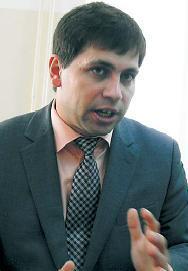VLADIVOSTOK, Russia -- Korean, notwithstanding the growing competition from Chinese, remains a viable language in Russia that brings in decent jobs and social status, according to a dean of a college at Far Eastern National University.
 |
| Alexey Starichkov | 밫here are many students in Russia who have come to believe that China offers better opportunities, but know for a fact that Korea still has a lot to offer our students,?Alexey Starichkov, dean of the College of Korean Studies, told The Korea Herald in fluent Korean.
Fairly high-class occupations such as the diplomatic service and national intelligence agencies are among the positions that graduates may contend for.
Despite the opportunities, the number of students majoring in Korean studies has declined 30 percent over the last five years. But Starichkov, as head of the only college in Russia dedicated exclusively to Korean studies, refuses to lose heart.
He proudly revealed that students of his college won first prize in their language capabilities in all areas -- speaking, writing and listening -- in an all-Russia contest in May.
밄y working together with the Seoul government, I know that the future will be bright for our college, especially in the year marking the 20th anniversary of diplomatic ties between South Korea and Russia,?he said.
The college itself had been built by the now defunct South Korean firm Kohap Group in 1995.
One reason for Starichkov뭩 sanguine outlook was the gradual but magnetic popularity of modern South Korean culture.
Movies such as 밠y Sassy Girl?-- a huge cinematic hit both at home and abroad, are provided to students not only for their entertainment, but as a guide for learning Korean.
Plenty of other popular South Korean movies and television dramas, such as 밊ull House?starring Rain, are among the film collection at the school뭩 recreation center.
In arts classes, students learn how to make complicated and colorful Korean macram?
One of President Lee Myung-bak뭩 autobiographies is also being used as an official text.
In the past, Starichkov said North Korean or so-called traditional culture dominated the school뭩 curriculum.
밯e have to admit that North Korea has had a huge influence on our studies and curriculum,?Starichkov said. 밫hese days, we are trying to keep up to date with South Korea and its popular culture because we don뭪 want to be teaching our students the outdated past.?
Vladivostok has significant ties with Korea as it was once a part of Korean territory during the era of the Balhae Kingdom (698-926) that was established after the fall of Goguryeo.
Many Koreans also took refuge in Russia -- mostly in the city of Ussuriysk, a two-hour drive from Vladivostok -- after the Japanese colonial rule started in the early 20th century. Korea뭩 first government in exile was set up in Ussuriysk.
Due to history and its close geographical distance to North Korea, North Korean cultures and traditions lingered at the school, including North Korean literature praising the Pyongyang regime.
The college library also featured North Korean weekly publications, along with copies of older editions of the Rodong Sinmun featuring photos of Kim Il-sung, the founder of North Korea.
As one incentive for drawing more students, Starichkov pointed to the new campus that will be built in the Russian (Russkiy) Island by March 2012.
That is the year that Vladivostok hosts the Asia Pacific Economic Cooperation forum.
The new 뱈ain?campus is to be built to accommodate more than 50,000 students and 7,000 participants of the APEC summit, the school said.
|